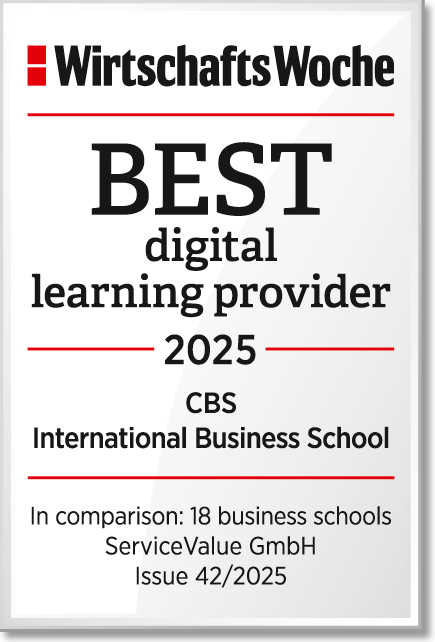International Business (M.A.)
Kickstart Your Global Career with the International Business Master’s at CBS!

International Business: Your master's degree for an international career in management
Globalisation constantly presents new challenges for companies, especially for multinational corporations. Businesses need leaders who think strategically, act interculturally, and possess strong business acumen. The English-taught Master’s in International Business prepares you to meet these demands. In just four semesters, you will develop the skills to make sustainable and forward-thinking decisions at the mid- and senior management level.
The programme is fully taught in English, with internationally experienced lecturers and a strong practical focus, making it the ideal foundation for a global career.
Throughout your studies, you will gain comprehensive expertise in international management. Key areas include strategic and values-based management, leadership and change management, international economics, business development, and accounting. You will not only acquire theoretical knowledge but also learn how small decisions can have a major impact on global businesses.
During your second and third semesters, you will have the opportunity to customise your degree with elective courses, allowing you to deepen your interests and shape your career path.
This Master's degree in International Business is the perfect choice if you aspire to a career in international management and want to be prepared for the challenges of global markets. Take advantage of studying at one of Germany’s top business schools, and become part of a new generation of leaders shaping the future!
*Tuition fees differ for EU and non-EU students. For the specific fees please check the tuition fees information page. Status: April 2025.

What Sets International Business at CBS Apart

Real Projects. Real Impact
Solve real challenges from companies like E&Y, UPS, and KPMG and present your solutions directly to decision makers.
Learn from Leading Experts
Learn from former C-level leaders, managers, and consultants who bring real-world leadership and consulting experience into the classroom.
NEW ERA Education for Future Leaders
The NEW ERA master concept links academic depth with hands-on application. You strengthen analytical thinking, decision making, and the ability to apply knowledge using AI tools and real business formats.
Study Globally. Work Globally
Study in an international community with students from 75+ nations and build the intercultural skills needed for leadership roles in global organizations.
Curriculum
Business Economics
3
ECTS
- Analysis of demand, supply, and market equilibrium
- Theory of consumer choice
- Theory of the firm, production and cost analysis
- Market structures: perfect competition, monopoly, monopolistic competition, oligopoly, contestable markets
- Game theory
- Pricing strategies
- Factor markets, labor economics
- Economics of information
- Industrial organization
- Limitations of markets and interventions by the government
- Econometric techniques related to these topics
Empirical Research Methods
3
ECTS
- Development of a research question
- Primary vs. secondary data
- Steps of research process
- Research designs
- Quantitative and qualitative data
- Structured methods of data collection: questionnaire and structured interview
- Un- and semi-structured methods: qualitative interview and focus group
- Quantitative and qualitative content analysis
- Ethical considerations of data collection
- Sampling
- Data analysis using statistical software programs (SPSS)
- Univariate analysis, bivariate analysis (crosstab and correlation), multiple linear regression
- Writing a research report – structural and other formal requirements
Strategic Analysis & Management
3
ECTS
- Strategy making process and strategic reasoning: cognitive process of strategy
creation through the prism of logic and intuition - Setting strategic purpose in the context of responsible stakeholder management
- Advanced external environment analysis: markets, industries and competitive
landscapes in static and dynamic perspective in the domestic and international
context - Diagnosing and managing strategic capability through national borders over time
- Cultural and institutional context of strategic management: concepts, frameworks
and analytical tools - Generic and interactive business strategies, inside-out and outside-in perspective on
achieving and sustaining competitive advantage internationally - Network-level strategies
- Corporate development and configuration: strategic options and portfolio matrices
- Strategy formation
- Strategic change and corporate restructuring
- Strategic renewal
- Strategy evaluation and strategic controls: tools and methods
- Organizing for success
Innovation Management & Digital Transformation
3
ECTS
- Diagnosing the change context: diffusion and dynamics of innovation
- Sources & types of innovation
- Product/service, process & business model innovation
- Individual and corporate creativity
- Strategic innovation management & the innovation process incl. New Product Development (NPD)
- Introduction to digitalization, digital age & digital divide
- Digital drivers & disruptive forces
- Technological drivers of digital transformation
- Socio-technological change associated with the adoption of the mentioned drivers
- Introduction to the digital organization & digital business models
- Impact of digitalization on the value chain (Industry 4.0)
- Digitalization-related innovation theories & technology management
- Digitalization leadership & organisational transformation concepts
- Change management & transformational leadership
- Agility and VUCA world
- SCRUM and Design Thinking
International Project Management
2
ECTS
- Social competence: Communication, motivation, groups and team structures, leadership, conflict management
- Methodological competence: Structural aspects, time management, cost management, human resource management, creativity and problem solving
- Organisational competence: Quality management, documentation, risk management, project start and closure
Language & Communication Skills
2
ECTS
The “Scholarly Writing and Analysis” course is offered for German native speakers. German as a foreign language is offered as an obligatory course for Non-native German speakers.
Corporate Social Responsibility
3
ECTS
- Cornerstones of sustainable management
- CSR as management approach
- Practical approaches of organizational effectiveness
- Tools for CSR implementation
- CSR and financial performance
- Life cycle assessment
Corporate Governance
3
ECTS
- Historical developments around the world
- Directors and board structures in different parts of the world
- Family business governance
- Role of institutional investors
- Corporate governance in mergers and acquisitions
- Socially responsible investments
- Corporate governance in different regions
Value Based Management
3
ECTS
- Value maximization and corporate objectives, shareholder value and stakeholder value approach
- Financial measurement of corporate strategies and competitive advantage: the principles
- Shortcomings of traditional profitability ratios for a value-based management
- Economic Value Added, Cash Value Added
- Identifying the drivers of value creation and investment decision-making
- Management compensation and incentives for value creation
Sustainable Supply Chain Management
3
ECTS
- Defining the state of a sustainable supply chain based on actual trends
- Discussion of various theoretical concepts (e.g. Stakeholder Theory, Slack Resource Theory) and their implications for sustainable supply chain management
- Defining a “New Normal” of how to do business (e.g. circular economy, regenerative business models, carbon literacy training)
- Sustainable Marketing (definition, Green Marketing Strategy Mix, Green Washing and Sustainable Consumer Buying Behaviour)
- Sustainable Procurement (definition, Sustainable Procurement Process Model with a focus on sustainable supplier relationship management; new trends like circular procurement)
- Sustainable Logistics
- Sustainable Design
- Carbon Emission / Human Rights in global supply chains
Business Project
6
ECTS
The overall objective of this course is to provide students with possibility of applying their business knowledge on concrete business situation, related to the field of their specialization.
By the end of the module students should be able to:
- Define project goals for the “client”.
- Work under the set timeframe and agreed project scope.
- Cooperate in the international project teams.
- Evaluate markets/ industries/ competitive landscapes.
- Develop possible strategic directions for the “client” business.
- Formulate recommendations.
Interdisciplinary Elective
3
ECTS
By choosing Interdisciplinary Electives in the second and third semester you can personalize your degree course and extend your management knowledge. An interdisciplinary elective is an elective from another discipline than your own specialization.
Master Thesis
18
ECTS
- Demonstrate mastery of your field by conducting independent research that addresses a relevant business topic
- Apply strategic frameworks and methodologies to analyse complex problems and develop evidence-based solutions
- Synthesise knowledge from multiple disciplines to generate insights and recommendations
- Communicate findings professionally through rigorous academic writing
Business Simulation Game
3
ECTS
In a business simulation game participants have to manage their own virtual company which operates in the same market as other participant-operated competitors. This involves making typical management decisions in realistic environments. Beside the deepening and active examination of subject-specific knowledge the simulation games also include the team environment, where interaction, communication and prioritization are of paramount importance. Participants learn how to manage risk and uncertainty while time is limited and information constrained. Group-reflections help to take over different perspectives and to discuss pros and cons of content- as well as behavior-related actions.
Venture Lab
4
ECTS
- Discovering and evaluating entrepreneurial opportunities
- Developing business ideas from opportunities (e.g. based on using Design Thinking, Personas and User Stories).
- Feasibility analysis of business ideas<
- Transferring the idea into a Business Model
- Business Model and its building blocks (value proposition, customers segments, channels, customer relationships, revenue model, key partners, key activities, key resources, cost structure)
- Business Plan: Introduction, Sample Case and General Outline
- Developing the details of the business plan
- Finding sources of financing: Business angels; Private equity; Start up financing; Venture capital investors<
- Preparing a pitch deck for successfully presenting the new venture business plan
Integrative Case Studies
3
ECTS
- Focused review of the curriculum content
- Pre-assessment quiz/ content area assessment as benchmark for students’ status quo
- Guide and Strategic Plan to Case Study Analysis
- Writing a proper Case Study Analysis report
- Developing proper answers to Case questions, applying the relevant theoretical knowledge and frameworks
- In-depth Case Study Analysis with a focus on all subject areas of the curriculum
- In-depth Case Study Analysis with a special focus on Strategic Management
Business Elective
3
ECTS
A business elective is a business or management-related elective course.By choosing Business Electives in the second and third semester you can personalize your degree course and extend your management knowledge.
Interdisciplinary Elective
3
ECTS
By choosing Interdisciplinary Electives in the second and third semester you can personalize your degree course and extend your management knowledge. An interdisciplinary elective is an elective from another discipline than your own specialization.
Master Thesis Tutorial
2
ECTS
During the Master Thesis Tutorial you will learn the fundamentals for your Master thesis: Defining the topic as well as structuring the thesis and you will learn the theoretical knowledge for scientific working.
Internship or Study Abroad
10
ECTS
You can choose between an internship (lasting at least eight weeks) or a semester abroad at one of our partner universities.
Event Management (Ted Talk) Seminar
2
ECTS
- Basics of event management
- Objective of the event and different types of events
- The event as a marketing and communication tool
- Planning and preparation
- Event execution
- Tasks and role of the event manager
- Choosing the right venue
- Personnel selection
Financial Analysis
3
ECTS
- Cash flows in the context of established valuation models (e.g., dividend discount model, DCF model and other present value-based valuation concepts)
- Fundamentals and differences between accrual accounting and cash accounting
- In-depth understanding of accrual accounting: cash inflows and cash outflows versus assets, liabilities, revenues and expenses; revenue and expense recognition principles; year-end adjustments
- Historical cost concept versus fair value concept
- Cash effects of specific assets and liabilities (CAPEX, working capital, deferred taxes, pension liabilities)
- Bridging the gap between accrual and cash accounting: statement of cash flows (information value; distinguishing between operating cash flows, cash flows from investing activities and cash flows from financing activities; indirect and direct methods of calculating cash flows
- Preparing forecast financial statements (including a forecast statement of cash flows
- Predicting cash flows from the business as a whole: Flow to Equity and Free Cash Flow
- Determine cash flows from future investments/assets (growth)
- Relevance of cash flow prognosis in insolvency proceedings.
Assessment Center Bootcamp
2
ECTS
- Consulting Industry/Professional Services as an example for an industry where ACs are key: Sector Overview incl. Company Profiles with focus on different specializations: HR, Strategy, Marketing, Finance etc.
- Job application and interview training
- Case study training, e-Case study training
- Framework for processing case studies
- Brain Teaser Training
- Case Simulation (Individual and Group Cases)
- Psychological tests
- In-Tray and Group exercise training
Corporate Development & Business Transformation
3
ECTS
- Organisations and Organisational Effectiveness
- Organisational Theory
- Basic Challenges of Organisational Planning and Development
- Organisational Design
- Management in Organisational and Ethical Culture
- Organisational Life Cycle
- Organisational Decision Making
- Organisational Development and Change
- Change Management in Mergers and Acquisitions
Customer Relationship Management
3
ECTS
- Relationship marketing vs. Transactional marketing
- Concept of the customer lifetime value
- Market segmentation and the customer lifetime value
- Marketing strategies in the field of CRM
- Big data marketing and CRM
- Multi-channel marketing and CRM
- Efficiency and effectiveness of loyalty programs
Service & Brand Management
3
ECTS
- Definition of services in comparison to manufactured goods
- The importance of Service Environment
- Challenges that must be identified and addressed by companies
- Developing effective service marketing strategies
- The Three-Stage Model of services
- Applying the 4 Ps to services:
- Service Product
- Distribution
- Pricing
- Promotion
- Balancing Demand against Productive Capacity
- Managing People in Services Marketing and improving Service Quality
- Importance of Customer Relationship Management in Services
- Service processes
- The Foundations of Identity-Based Brand Management
- The Concept of Identity-Based Brand Management
- Strategic Brand Management
- Operational Brand Management
- Identity-Based Brand Controlling
- International Identity-Based Brand Management
Strategic Human Resource Management & Leadership
3
ECTS
- Theory of strategic HRM
- Strategic HRM and business strategy
- Strategic HRM and organisational performance
- Strategic HRM in a complex and uncertain environment
- Strategic HRM in MNEs vs. SMEs
- Strategic Staffing
- Strategic Training and Develop Management
- Strategic Compensation and Rewards
- Strategic HRM and Sustainability
- Leadership Theories / Models and Leadership Traits
- Leadership Styles
- Cognitive, Behavioural, and Emotional Explanation for Human Motivation
- Performance Management and Controlling
- Leadership Tools
Strategic Digital & Social Media Marketing
3
ECTS
- Concepts: Online Marketing/ Digital Marketing
- Digital marketing sub-disciplines and major activity areas
- Performance measurement using Web analytics (e.g. Metrics and Tools)
- Data-driven Advertising
- Programmatic Advertising
- Legal and ethical aspects of digital marketing (e.g., EU’s General Data Protection Regulation (GDPR))
- Strategic planning and design of a social media marketing campaign
Experience Lab: Search Engine Marketing
3
ECTS
- Introduction: definition
- Search Engine Optimization / SEO
- Keyword research
- On-page SEO
- Web analytics and SEO tools
- Search Engine Advertising/ SEA
- Campaign settings
International Law
3
ECTS
- Foundations to Organization Theory
- External & internal factors to change organizations
- Organizational goals and instruments
- Creating effective organizations
- Organizational development & change
- Alignment issues
- Organizational controlling
- Concluding a contract
- Different types of contracts and their typical features
- Performance and obligations
- Solving problems (e.g. failure to perform, liabilities)
- Safeguarding creditors’ rights
- Forms of business organizations
Digital Strategizing
3
ECTS
- Fundamentals
- Starting points for digital strategies (selection)
- Challenges in introducing digital strategies – four fights
- Identification of success factors for digital strategies (selection)
- Agile strategy management
- Social and ethical aspects of digital strategies
Business Models in the Digital Era
3
ECTS
- In this course, students acquire skills to develop and evaluate digital business models and learn how selected business systems and applications can improve a company’s performance.
- Students know the function, structure and types of business models and selected systems and can describe and explain how and to what extent business models change.
- They understand the impact of digital technologies and business systems and the relevance of data for high performing business models.
- They can explain the need to adapt existing business models or develop new ones in the face of the growing importance of digitalization in diverse industries.
- Students are familiar with state-of-the-art business model frameworks and apply them to support digital business model development.
- They develop their own digital business models, present their ideas in a pitch format and evaluate their results.
International Corporate Finance
3
ECTS
- Overview of corporate finance(ing) and company structures
- Present values
- Future values
- Introduction to valuing stocks
- NPV and other investment criteria
- Decision making with NPV and other criterial
- Working capital management
- Efficient Markets and Behavioural Finance
One Master. Three Tracks
Your career goals are unique, and your study path should be too. That’s why we offer you full flexibility: simply choose the 120, 90, or 60 ECTS track that best matches your academic background, your schedule, and your ambitions. Whether you want to fast-track your entry into the job market or dive deep into specialization, at CBS you can design the Master’s degree that fits your life.
120 ECTS
90 ECTS
Career Opportunities with a Master’s in International Business
A Master’s in International Business opens up various career paths across all areas of multinational companies, including marketing, human resources, controlling, and corporate governance. CBS alumni have successfully launched careers in the automotive industry, consulting, controlling, and the financial sector.
Below, you’ll find top career opportunities with your Master’s in International Business.
Why CBS UNIVERSITY
Your path to CBS
Starting your studies at CBS University of Applied Sciences is as unique as you are – and at the same time, completely hassle-free. With our user-friendly online application process, you can apply from anywhere, with no numerus clausus restrictions. Instead of rigid admission requirements, we focus on a personal selection process that highlights your strengths and potential.
Whether you choose a dual, part-time, or full-time programme, CBS University offers the perfect combination of theory and practice.

Admission Requirements
Application Deadline
You can apply to CBS year-round, even before completing your high school diploma. For dual study programmes, we recommend applying well in advance so we can help you find the right practice partner. The start of your studies is flexible: in the winter semester or, for selected programmes, in the summer semester. To secure one of the limited study places and allow enough time for visa applications if needed, we recommend applying early.
Financing
A dual or part-time study programme is often financed by your practice partner, who also provides valuable professional support. For full-time studies, various funding options such as BAföG or scholarships are available to help you balance your studies and personal development.
HANDS-ON LEARNING AT ITS BEST
At CBS, it’s not just what you study that matters, it’s how you study. Our programmes offer a completely new learning experience: hands-on, interactive, and firmly rooted in real-world practice. You’ll notice your skill set growing day by day through real projects, modern tools, and intensive practical experience. Our lecturers bring years of industry expertise to the classroom, and regular guest speakers give you exclusive insights into professional life. Artificial intelligence, teamwork, presentations, networking, and real business cases are all part of your everyday studies. It’s not just about preparing for the future – it’s about shaping it yourself.
Business Projects
As part of the Business Projects at CBS, students collaborate with renowned companies on real-world projects. This hands-on learning approach combines theoretical knowledge with practical business challenges, providing deep insights into professional workflows.
Corporate Partnerships
With over 1,300 established corporate partners across various industries, CBS students gain exclusive access to the business world. These collaborations offer exciting opportunities, help build valuable networks, and create long-term career prospects.
Internships & Work Experience
Whether through mandatory internships—an integral part of many study programmes—or by incorporating professional experience into dual and part-time study formats, you can apply your expertise directly in real-world settings.
Maximal Praxisnah
An der CBS zählt nicht nur, was du studierst, sondern wie. In unseren Studiengängen erlebst du Lernen völlig neu: anwendungsorientiert, interaktiv und mit direktem Bezug zur Realität. Du wirst sehen, wie sich dein Skill-Set von Tag zu Tag erweitert, durch reale Projekte, moderne Tools und intensive Praxiserfahrung. Unsere Professor:innen bringen langjährige Erfahrung mit, und durch regelmäßige Gastvorträge erhältst du exklusive Einblicke in die Praxis. Künstliche Intelligenz, Teamarbeit, Präsentationen, Networking und reale Business Cases gehören zu deinem Studienalltag. So bereitest du dich nicht nur auf die Zukunft vor – du gestaltest sie aktiv mit.
Business Projects
Im Rahmen der Business Projects an der CBS International Business School haben Studierende die Möglichkeit, gemeinsam mit renommierten Unternehmen an realitätsnahen Projekten zu arbeiten. Diese praxisorientierte Lehrform verbindet theoretisches Wissen mit konkreten wirtschaftlichen Fragestellungen und gewährt tiefe Einblicke in berufliche Abläufe.
Unternehmenskooperation
Dank eines Netzwerks von über 1.300 etablierten Unternehmen aus diversen Branchen profitieren Studierende von exklusiven Einblicken in die Arbeitswelt. Diese Kooperationen eröffnen nicht nur spannende Perspektiven, sondern fördern auch die Entwicklung wichtiger Kontakte und bieten nachhaltige Karrieremöglichkeiten.
Praktikum/Berufserfahrung
Ob in Form von Pflichtpraktika, die fester Bestandteil vieler Studiengänge sind, oder durch die Integration von Berufserfahrung in duale und berufsbegleitende Programme: Du kannst dein Fachwissen direkt in der realen Arbeitswelt anwenden.
HANDS-ON LEARNING AT ITS BEST
At CBS, it’s not just what you study that matters, it’s how you study. Our programmes offer a completely new learning experience: hands-on, interactive, and firmly rooted in real-world practice. Through our approach of combining theory and practice, you can directly apply everything you learn during your part-time master’s program while simultaneously bringing your own professional experience and skills into the courses.
Conventions
Once per semester, an on-campus weekend with an event-like character takes place at rotating CBS locations, each focusing on different thematic priorities. These conventions foster personal exchange, interdisciplinary learning, and hands-on leadership experience.
Learn from Leading Experts
At CBS, you learn from real professionals in their respective fields. Depending on the topic, professors from our faculty design and deliver courses together with external lecturers from the business world.
Specialization
Starting from the second semester, you can optionally choose the specialization “Business Technology.” This allows you to deepen your knowledge in digital transformation and further develop your expertise in technological innovation within an interconnected economy.
HOW DO I FIND MY PERFECT CAREER PATH?
The Career Service and Talent Development team at CBS support you in finding your ideal partner company. With 1:1 coaching, workshops, and a wide network of corporate partners, we guide you throughout your entire time at university. Together, we’ll develop a strategy that matches your strengths and career goals.

Ablauf deS Masterstudiums


Inspiration and Impact – What Our Alumni Say
Let yourself be inspired by the experiences of our alumni and discover how the Master’s degree at CBS has shaped their professional and personal development.
FAQ: The most important questions about studying International Business
Here you can find answers to all important questions all around your International Business master's degree. If you have any further questions, feel free to contact us at any time.
What is International Business?
Why should you study the International Business Master’s programme?
How long does the International Business Master’s programme last?
Does the International Business Master’s programme have a Numerus Clausus (NC)?
What are the admission requirements for the International Business Master’s programme?
How is the International Business Master’s programme structured?
Where can I study the International Business undergraduate programme?
What will I learn in the International Business Master’s programme? What are the core subjects?
How much can you earn after completing your International Business studies?
Can I write my Master’s thesis in collaboration with a company during the International Business studies?
Any questions? We're here to help
Do you have any questions about our bachelor's or master's degree programs? Our Student Advisory team is here to support you! Schedule your personal consultation—online or in person—for tailored, non-binding guidance on finding the right study program for you.






























